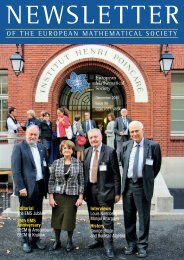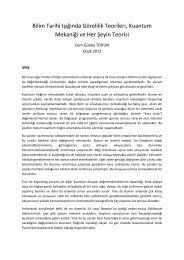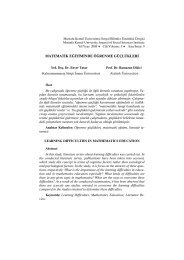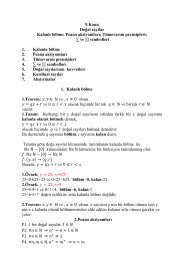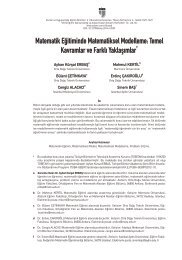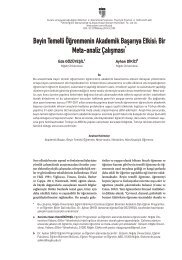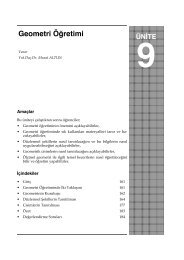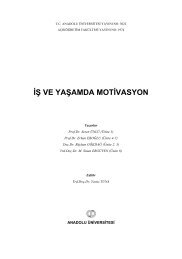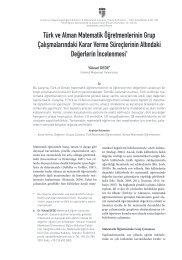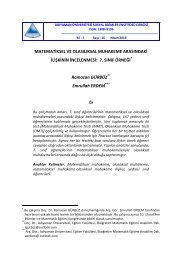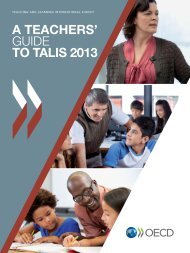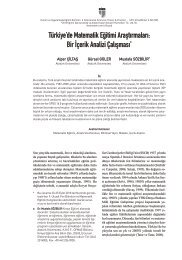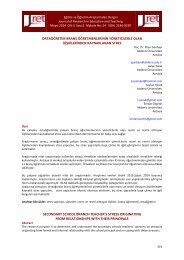RQ 2: What are the strengths and weaknesses of the program in terms of the application ofthe reflective practice from the student teachers’ perspective?Setting and ParticipantsThis study was carried out at Gazi University, English Language Teaching program on242 senior student teachers (female: 182 and male: 60), aged between 22 and 25. The ELTprogram offers the students a four-year program, which was revised radically in 1997 toinclude various methodology courses in which student teachers go through a reflectiveprocess. The improvement in 1997 excluded the theoretical linguistics and literature coursesand suggested new courses such as ‘Teaching English to Young Learners’, ‘Special TeachingMethods’, ‘Subject-matter Course Book analysis and Evaluation’ and many others. Thecommon grounds of all courses were based on offering student teachers courses in which theycan actively participate, test their hypotheses on language teaching and learning throughmicro teaching demonstrations that were shaped by reflection and feedback. Following thisinnovation in the program, yet another improvement was made in 2005 to include courses like‘Creative Drama’, ‘Teaching Language skills I and II’. The last modification can be seen as acomplimentary attempt, rather than a radical one, aiming at updating the program in parallelwith the teacher education policies and requirements of the European Union.Data Collection and AnalysisELT student teachers were administered a questionnaire consisting of 25 items. Theitems were centered on six themes namely (1) reflection through self-evaluation, (2) reflectionthrough formal instruction, (3) reflection through observation, (4) reflection through talking,(5) reflection through practical experience, and (6) reflection through research. Thequestionnaire developed by Al-Issa and Al-Bulushi (2010) was employed to survey about theroles, approaches and strategies used by teacher trainers to help the student teachers to reflecton their teaching.Piloting is an essential part of any quantitative research and “any attempt to shortcutthe piloting stage will seriously jeopardize the psychometric quality of the study” (Dörnyei,2007, p. 75). This crucial point led the researchers to plan every single stage of designing,piloting and administrating the study. Hence, the researchers piloted the questionnaire withfifty student-teachers from the same population. As table 1 shows below, the questionnairewas found to be highly reliable (Cronbach’s Alpha = 0.81). (See table 1 for detailed analysisof reliability analysis).80
Table 1: Reliability Analysis of the Questionnaire Factors Factor I-‐ Reflection through self-‐evaluation Factor II-‐ Reflection through formal instruction Factor III-‐ Reflection through observation Factor IV-‐ Reflection through talking Factor V-‐ Reflection through practical experience Factor VI-‐ Reflection through research Cronbach Alpha 0.85 0.82 0.84 0.81 0.80 0.79 Findings and DiscussionAs mentioned in the methodology section, the questionnaire is composed of sixthemes. Thus, this section focuses on how ELT student teachers evaluate these six themes intheir own contexts. As one can see in table 2, most of the items have centered around theoptions either “agree” or “strongly agree”. However, we discuss only salient findings of theresearch below.Table 2: Student Teachers’ Evaluations of Reflective Teaching in Their Program Mean Std. Deviation Std. Error Mean S1 2,1417 ,98776 ,06376 S2 2,2218 1,00262 ,06485 S3 1,6250 ,85386 ,05512 S4 2,5435 1,43403 ,09276 S5 1,6033 ,86403 ,05554 S6 1,5625 ,85095 ,05493 S7 2,4473 1,12482 ,07306 S8 2,3760 1,10971 ,07133 S9 2,1983 1,04758 ,06734 S10 1,7647 ,76535 ,04961 S11 1,5462 ,79818 ,05174 81
- Page 1 and 2:
ISSN: 2146-7676UFUK ÜNİVERSİTES
- Page 3 and 4:
UFUK ÜNİVERSİTESİSOSYAL BİLİM
- Page 5 and 6:
SUNUŞDergimizin 2014 yılı ilk sa
- Page 7 and 8:
A NEED-BASED EVALUATIONOF A PREPARA
- Page 9 and 10:
In the literature on language teach
- Page 11 and 12:
focus teaching on this. Accordingly
- Page 13:
International Relations) were 20 (7
- Page 16 and 17:
questionnaire in their English-medi
- Page 18 and 19:
REFERENCESAlagözlü, N. K. (1984).
- Page 20 and 21:
APPENDIX A1 STUDENT QUESTIONNAIRE
- Page 23 and 24:
24. Converting short notes into
- Page 27 and 28:
The Role Of Gender On University St
- Page 29 and 30: (Johnson 2001; Türküm, 2005). Joh
- Page 31 and 32: Table 1 : Means and Standard Deviat
- Page 33 and 34: 2.3 ProcedureEthical permission to
- Page 35 and 36: age and attitude toward help seekin
- Page 37 and 38: Economics and Administrative Scienc
- Page 39 and 40: REFERENCESAddis, M. E., & Mahalik,
- Page 41 and 42: Koydemir-Özden, S. (2010). Self-as
- Page 43 and 44: LİSE ÖĞRENCİLERİNİN MESLEKİ
- Page 45 and 46: göre mesleki bakımdan daha önce
- Page 47 and 48: Araştırmanın amacıMesleki olgun
- Page 49 and 50: Tablo 1: Lise Öğrencilerinin Mesl
- Page 51 and 52: Lise öğrencilerinin karar verme s
- Page 53 and 54: KAYNAKÇA Acıbozlar, Ö. (2006). Y
- Page 55: Oğuz, Ö. (2008). Lise öğrencile
- Page 58 and 59: 1. IntroductionDifferent from the p
- Page 60 and 61: noteworthy to mention that multilin
- Page 62 and 63: The findings indicate that multilin
- Page 64 and 65: Table 1. Descriptives statistics fo
- Page 66 and 67: overall six factor structure which
- Page 68 and 69: wider variety of strategies with a
- Page 70 and 71: inclusion of instructors who are no
- Page 72 and 73: Gardner, R. C., & MacIntyre, P. D.
- Page 74 and 75: AppendicesAppendix A- English Profi
- Page 77 and 78: ELT Student Teachers’ Evaluations
- Page 79: Reflective Teaching in TurkeyIn Tur
- Page 83 and 84: Table 4: Mean and standard dev
- Page 85 and 86: Table 9: Mean and standard dev
- Page 87 and 88: ReferencesAkbari, R. (2007). Reflec
- Page 89: Pollard, A. & Triggs, P. (1997) Ref
- Page 92 and 93: 1. GİRİŞEğitim ve program geli
- Page 94 and 95: Genelgeçer tek bir bilimsel sürec
- Page 96 and 97: Program geliştirmedeki yenilikleri
- Page 98 and 99: -Elde ettiği sonuçlardan hareket
- Page 100 and 101: “İnternet Üzerinden Öğrenme
- Page 102 and 103: de sınıf içi dersler de öğrenm
- Page 104 and 105: teknik ve pedagojik uzmanlar gerekt
- Page 106 and 107: 3. Proje ekibinin kurulması4. Plan
- Page 108 and 109: KAYNAKÇABigdoli, H. (2004). The In
- Page 110 and 111: 110
- Page 112 and 113: Hiçbir öğrenci bir diğeriyle ay
- Page 114 and 115: İçerik sınıfta nelerin öğreti
- Page 116 and 117: (MEB, 2006; Tomlinson, 2005). Ek ol
- Page 118 and 119: - Öğrencilerden gereksinim duyduk
- Page 120 and 121: desteklerine gereksinim duydukları
- Page 122 and 123: KAYNAKÇAAlberto P. A, ve Troutman
- Page 124 and 125: 124
- Page 126 and 127: 1.GİRİŞBuradaki araştırma OECD
- Page 128 and 129: öğretilenleri almışlar mı diye
- Page 130 and 131:
edileceğini araştırmaz, ancak bu
- Page 132 and 133:
yaşarlar: Çok fazla sayıda koşu
- Page 134 and 135:
• Birincil Stratejiler ve Destek
- Page 136 and 137:
ir dönemdir. Özellikle artan yaş
- Page 138 and 139:
2. Hipotez: Öğretmenlerin coğraf
- Page 140 and 141:
Tablo 7 Öğretmenlerin Coğrafi
- Page 142 and 143:
stratejileri”ne yönelik bilişse
- Page 144 and 145:
sonuçları χ 2 (12, N =407) = 13,
- Page 146 and 147:
sebebiyet verir. Bunun önemli bir
- Page 148 and 149:
KAYNAKÇAArtelt, C., Stanat, P., Sc
- Page 150 and 151:
Lieteratur. 10. Sonderheft: Lesesoz
- Page 152 and 153:
YAYIM ALANI, YAZIM KURALLARI ve YAZ
- Page 154:
• Birebir alımlar “…” İş




